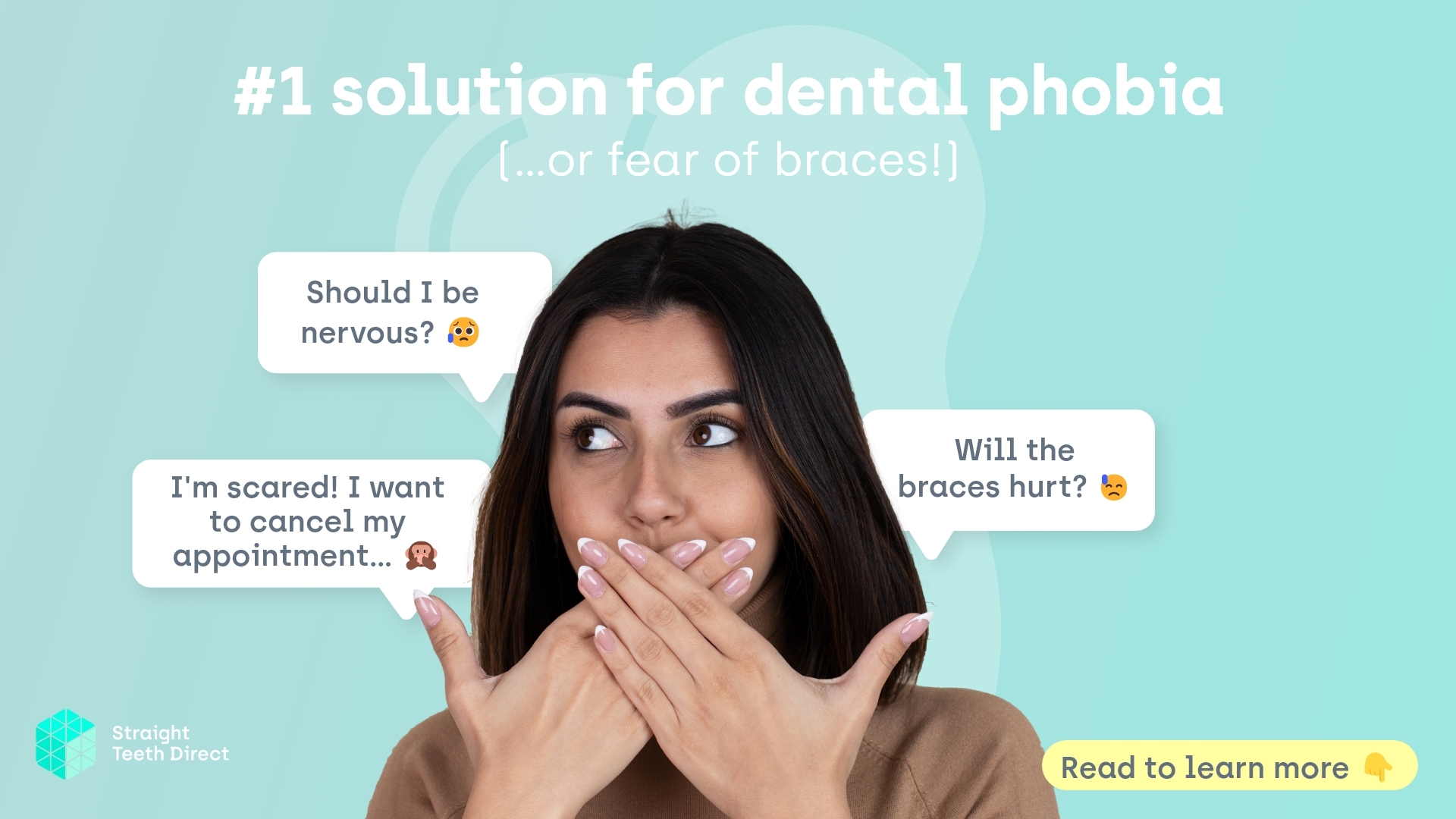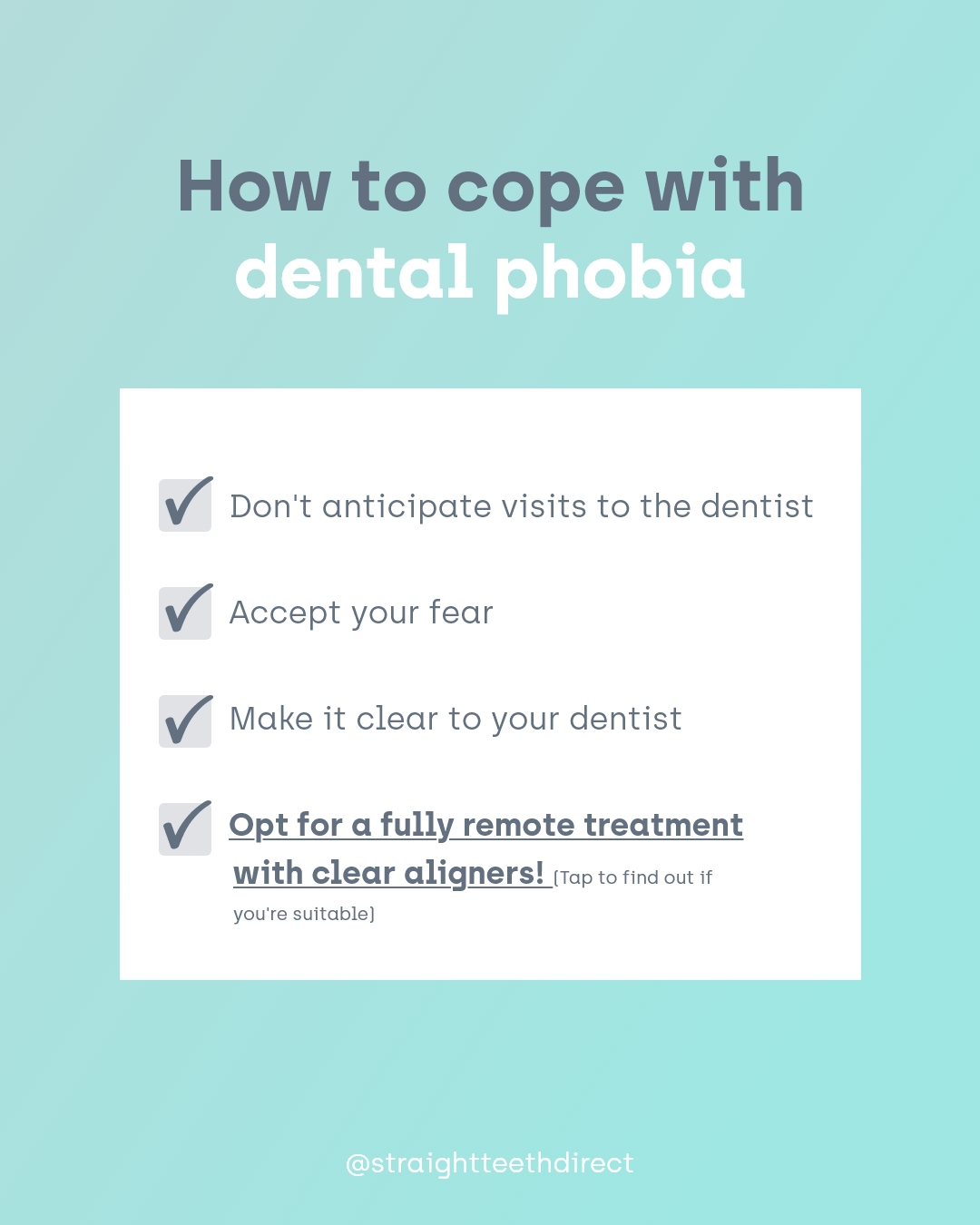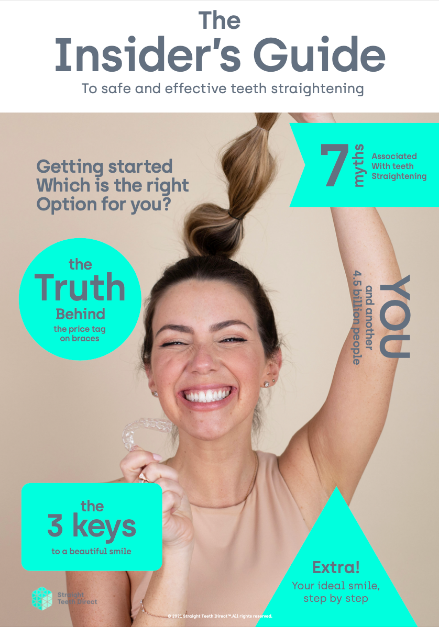
#1 solution for dental phobia (…or fear of braces!)

Key points:
- Dental phobia, also known as dental anxiety, dentophobia, or fear of dentists, is a condition that causes people anxiety when going to the dentist or even thinking about dentist appointments.
- Braces can also trigger anxiety. This has been shown in several studies, for example, Lewis and Brown found that 25% of the patients surveyed were anxious about wearing orthodontic appliances (including braces).
- Aligners do not hurt more than braces, in fact, aligners are known to be significantly more comfortable than traditional braces.
- Remote aligner treatment is a safe, professional solution for teeth straightening despite fear of the dentist.
What is the fear of braces called and is it the same as fear of dentists?
There are different kinds of fears around dentistry, and not all these fears are the same. Let’s take a look at each of them:
-
What is dental phobia?
Simply put, dental phobia is the fear of going to the dentist. In a recent study, researchers show that 11.7% of the general population suffers from high dental fear. Another 17.5% experience moderate dental fear, 36.5% had not been to the dentist in over a year, and around 15.5% had minor dental phobia and avoided going to the dentist. As we can see, dental phobia affects a large portion of the population, preventing many from feeling confident with their smile!
-
What is Odontophobia?
Odontophobia is often used as a synonym for dental phobia, describing a fear of any situation connected to dentists. Etymologically speaking, odontophobia or orthodontic phobia means “a fear of orthodontists” (who perform different jobs than dentists). However, in general, the terms dentophobia and odontophobia can be interchanged as people rarely differentiate between dentists and orthodontists when it comes to an anxiety response. Fear of wearing braces, though, is something else…
-
“I’m scared to get braces”
Fear of braces revolves around anxiety connected to the physical discomfort and visual aspect of wearing them. Everyone had one or more friends at school who wore braces and complained about the pain, and the unsightly metal attachments and wires often cause people to self-consciously stop smiling. So, this leads us to the next question…
Can braces trigger anxiety?
Any negatively internalised situation can trigger an anxiety response, whether it’s something we have personally experienced or not. Fixed braces and teeth straightening are traditionally associated with significant pain, sore or bleeding gums, tricky dental hygiene and a reluctance to smile freely for fear of the “ugly” metal attachments and wires. As a result, the idea of getting braces – or of any teeth straightening treatment – can trigger uneasiness and even anxiety.
Should I be nervous about Invisalign®?
Invisalign is an aligner company that provides clear aligners treatment, which, as we now know, is much more comfortable than fixed braces. However, there are still plenty of dentist appointments involved in the process. For those with braces anxiety, this could be a good option, but if you suffer from dental phobia, it may not be the best solution for you.
Luckily, fully remote orthodontic treatment with invisible aligners is now available. At Straight Teeth Direct, for example, the entire process takes place from the comfort of your home. If you are unsure if you can handle the clinic visits, this is an ideal, safe and professional solution.
How to cope with dental phobia?

-
Try your best not to anticipate visits to the dentist.
Put the event out of your mind and focus on other things that bring you joy. You can also make a habit of planning fun things immediately before and after your appointments, so that you begin associating positive experiences with the dentist.
-
Recognise that you are afraid of going to the dentist and that it’s OK!
Having a specific fear is very normal and nothing to be ashamed of. As we mentioned earlier, around 50% of all people worry about dentist visits: you’re not alone!
-
Make your dental phobia clear to your dentist.
Dentists have a lot of experience dealing with anxious patients. If you explain to them that you have a fear of dentists then they can be mindful of your situation and guide you through the appointment accordingly.
-
Say no to dental phobia with remote aligners!
At Straight Teeth Direct, you are directly connected with a dentist via the mobile app, and every step of your teeth straightening journey is completed under professional supervision from the comfort of your own home. Your free initial suitability consultation and monthly progress checkups are performed by our team of dentists through our unique app platform, and all your medical devices are sent straight to your door.
Do aligners hurt more than braces?
No! If your worries around braces revolve around the potential pain involved, then we can put your mind at ease: this won’t be an issue! Clear aligners are widely regarded as pain-free, though the level of comfort may vary from person to person.
One thing is for sure: Straight Teeth Direct aligners cannot be compared to fixed braces when it comes to comfort. There are no brackets, wires, rubber bands, nor any fixed attachments or metal inside your mouth at all. The entire process is non-invasive and designed for maximum comfort.
FAQs
Is Dental phobia common?
- About 36% of people in the U.S. have a fear of dental treatment, with 12% having an extreme fear. About 3% of adults in industrialised countries may have dentophobia and avoid going to the dentist altogether.
- Fear of dentists is more common in females than in males. Some studies suggest that nearly 3% of men and almost 5% of women have dentophobia.
What causes dental phobia?
Everyone is different and there are a number of causes that can lead to dentophobia, including:
- Past negative experiences
- Feeling stuck or restrained in the dentist chair or while keeping your mouth open
- Embarrassment, perhaps around the appearance or health of your teeth
- Knowing someone who struggles with dentophobia
- Trouble breathing through your nose instead of your mouth
- Stressful noises from drills
- Sensitive gag reflex
What are some of the most common dental anxiety symptoms?
Just like there are many causes, everyone may experience dental phobia differently, with common symptoms including:
- difficulty breathing
- dizziness
- chills
- sweating
- heart palpitations
- shaking
- indigestion

Still thinking about it?
Fill in your email to receiveyour free guide!


















